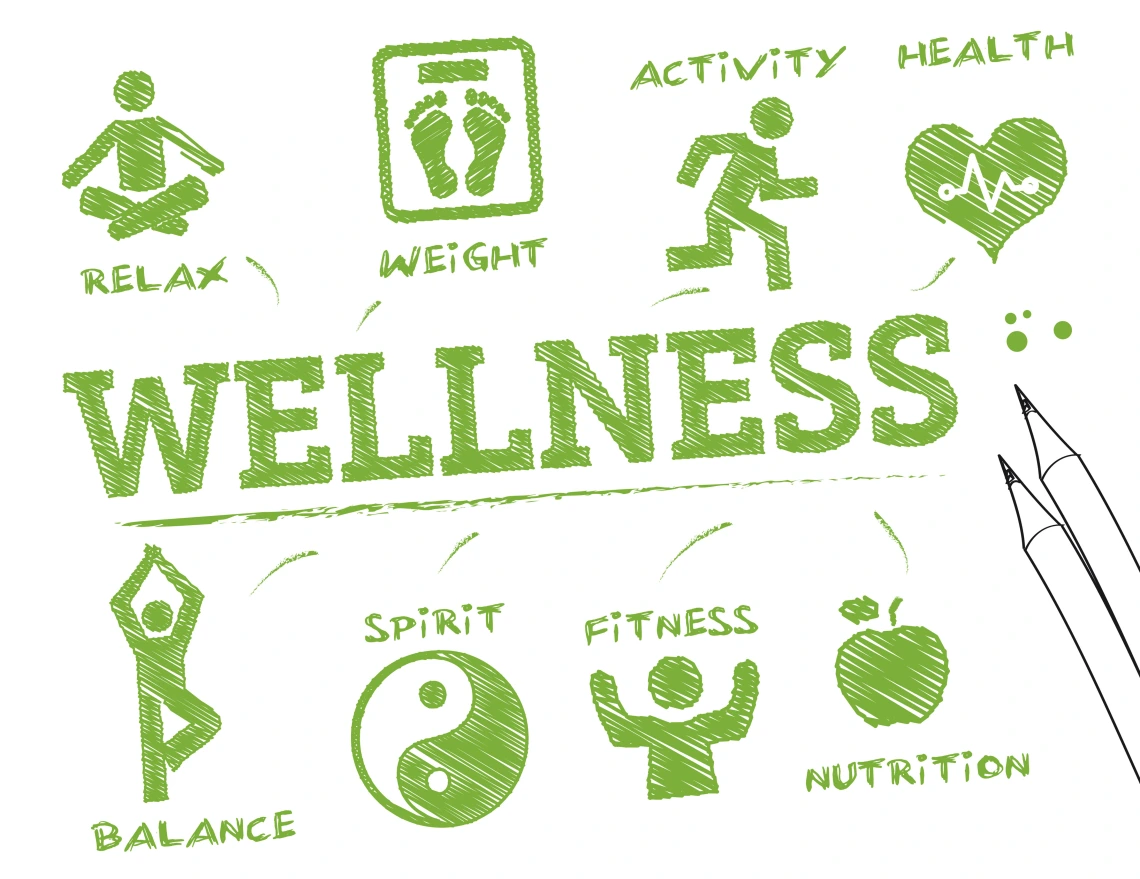Multidimensional Wellness

In the past, when I heard the word wellness, I thought of smooth stones stacked on top of each other while clear water ran somewhere nearby. Wellness was getting away from the world’s challenges to a tranquil place. That definition wasn’t quite accurate.
Wellness—as defined by mental health professionals in academia—isn’t about removing all of the challenges from your life. It’s about being able to meet them head-on and having the support network and self-efficacy to overcome them. At first, that struck me as strange, but think about it: Have you ever had a class that was so easy you felt like you were wasting your time? How did you feel when you passed that class, as opposed to when you passed that rigorous weed-out course that pushed you to your limits? Odds are you felt better when you overcame the bigger obstacle. It feels good to be challenged and succeed.
But grad school is consistently challenging, so why aren’t we walking around in a state of perpetual bliss?
“When you’re not well,” says Ryan Daily, Supervisor of Life Management Counseling Innovation, “it’s because the system that you’re in is overwhelming you. That’s when growth stops, and you withdraw.”
That withdrawal can be social, emotional, mental, you name it. When the size of the challenge dwarfs your attempts to overcome it, your wellness suffers. As in the case of Amanda Bogden, a Ph.D. student in Higher Education.
“My transition here was super difficult for me,” says Amanda. “I left a high paying job. I left a lot of structure. The landscape in Arizona is completely different from the landscape in California, so that was a complete shock. And I had to figure out my finances again. It was really hard.”
When life throws challenge after challenge at you, it can be easy to feel like you’ve hit an insurmountable wall.
“But when you run into that wall, which some grad students do,” says Ryan, “that’s where professional support can give you a boost to overcome it.”
Professional counseling help can mean a lot of things. Options include one-on-one therapy, group therapy, and workshops, all of which are offered through UA’s Counseling & Psychological Services. Everyone occasionally experiences high stress levels, but when they start to disrupt your life, that’s an indication that professional support may be needed.
But sometimes professional counseling support is not the answer. For instance, if your stressors are primarily financial—the answer might be getting financial wellness coaching at UA’s Thrive Center. Sometimes, however, it’s not always clear what is causing your stress, and in these situations, a counselor can assist you with identifying which areas of your wellness might need more attention. Ryan likes to use the Eight Dimensions of Wellness model, which helps to look at wellness holistically in all the major areas of one’s life.
The Eight Dimensions of Wellness are social, emotional, financial, occupational, spiritual, environmental, physical, and intellectual. The model asks students to consider which facets of their life may need improvement and then to set realistic, repeatable goals to improve them. You can find more detailed information here.
Your goals and the ways you achieve them are up to you. If you need to boost your physical wellness, you might find long walks helpful, or you might prefer a weekly soccer game. On the other hand, if you want to boost your emotional wellness, one self-support method that many people find highly effective is mindfulness.
“Mindfulness is both a state of being—being present, being aware of what is happening right now—and also a skill that we can develop with deliberate practice,” says Leslie Langbert, Director of the Center for Compassion Studies. “We offer drop-in mindfulness practice sessions, called Mindful Mondays, every Monday at 5:30 p.m., with options to be in-person or online every fall and spring semester. We also offer compassion programs, workshops, and events with our campus partners, including the UArizona Museum of Art and Outdoor Rec.”
But, again, your goals may vary from more popular practices and still manage to surprise and delight you.
“I came to procure a puppy,” says Amanda, “and he’s probably the best thing that’s happened to me since I came here. He keeps me sane, even though he drives me nuts. He’s the one who keeps my days structured. I have to have school and work figured out so I can spend time with him. He also gets me out of the house—exercising, exploring, taking breaks, making friends outside of school—which is a huge help.”
I’m not saying that to take care of your wellness you need to go out and buy a puppy. My point is that taking care of yourself might mean adding another responsibility to your life, but it might make all your other responsibilities easier to manage.

